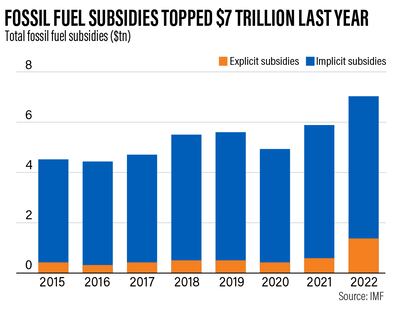Fossil-fuel subsidies surged to a record $7 trillion last year amid a surge in global energy prices following Russia’s invasion of Ukraine and as the global economy rebounded after the Covid-19 pandemic.
Subsidies for oil, coal, and natural gas are costing equivalent to 7.1 per cent of the global gross domestic product, which is more than what governments spend annually on education, the International Monetary Fund said in a report on Thursday.
Fossil-fuel subsidies rose by $2 trillion over the past two years as explicit subsidies – direct government expenditure – more than doubled to $1.3 trillion, the fund said.
“Consuming fossil fuels imposes enormous environmental costs – mostly from local air pollution and damage from global warming,” the IMF said.
“The vast majority of subsidies are implicit, as environmental costs are often not reflected in prices for fossil fuels, especially for coal and diesel.”

Consumers did not pay for more than $5 trillion of environmental costs last year, based on the fund’s baseline assumption that global warming costs are equal to the emissions price needed to meet Paris Agreement goals.
Implicit subsidies, where governments do not charge enough for the environmental damage caused by the industries, are projected to grow as developing countries boost their consumption of fossil fuels towards the levels of advanced economies, the IMF said.
Global coal demand will stay at record levels this year, boosted by strong growth in Asia for power generation and industrial activity, according to the International Energy Agency.
Coal consumption rose by 3.3 per cent to 8.3 billion tonnes last year as coal-fired power plants were brought back in Europe and other regions after Russia’s invasion of Ukraine, the Paris-based agency said in a report last month.
Meanwhile, global oil demand is set to expand by 2.2 million barrels per day this year, with China accounting for more than 70 per cent of that growth, the IEA has said.
The IMF has estimated that scrapping explicit and implicit fossil-fuel subsidies would prevent 1.6 million premature deaths annually and raise government revenue by $4.4 trillion.
“If governments removed explicit subsidies and imposed corrective taxes, fuel prices would increase,” the fund said.
“This would lead firms and households to consider environmental costs when making consumption and investment decisions.”
The removal of subsidies is also expected to redistribute income as fuel subsidies benefit rich households more than poor ones, the IMF said.
The UN body also said that governments must design and implement reforms “clearly” and “carefully” as part of a comprehensive policy package that underscore the benefits.
“A portion of the increased revenue should be used to compensate vulnerable households for higher energy prices,” the IMF said.
“The remainder could be used to cut taxes on work and investment and fund public goods such as education, healthcare, and clean energy.”
A World Bank report from May found that subsidies for fossil fuels, agriculture and fisheries exceed $7 trillion each year in explicit and implicit subsidies, representing about 8 per cent of the world’s GDP.
Redirecting fossil fuel subsidies could unlock at least half a trillion dollars to be put to more productive and sustainable uses, according to the World Bank.








